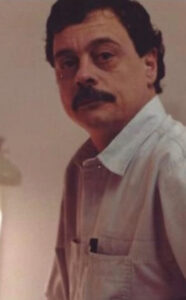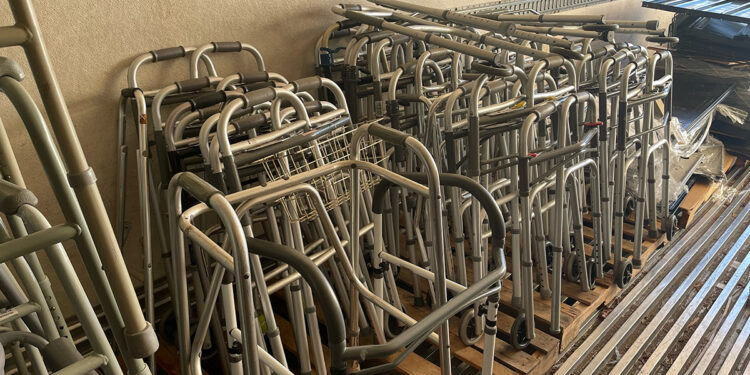WETUMPKA, Oklahoma – The Muscogee (Creek) Nation Native American Caregiver Program, managed by MCN Community and Human Services department was the recent recipient of a generous equipment donation by the family of Mike Holleyman (Mvskoke). The donation will benefit the department’s lending closet. One of the many services offered by the department, the lending closet, consists of items caregivers might need, such as walkers, shower chairs, and adult diapers.
The term caregiver refers to caring for others who can not support themselves. It refers to people that take care of senior citizens with disabilities and can include those who care for anyone who can not live on their own without a caregiver. Caregivers often provide essential care for children, spouses, or neighbors.
In addition to providing equipment and periodic caregiver assistance, the department also provides counseling in group and individual sessions.
Eric Yahola is a caregiver advocate within the Native American caregiver program. While his department is small, they support those caring for others.
“We provide respite for them,” Yahola said. “We can pay someone to come in and take their place if they need a break or run errands. The respite worker will come in and relieve them.”
Yahola has worked with the nation for 11 years. Initially working in food distribution, he would eventually find himself serving citizens in a different capacity through caregiver support.
“It’s gratifying. It’s not like work when you enjoy what you’re doing,” Yahola said. “It just feels like a part of what I’m supposed to do, just a part of life.”

Holleyman family donation
Kerri Hibdon and her sister, Melanie Blankenship (Mvskoke), were aware of the nation’s services from their father, Mike Holleyman. According to Hibdon, Holleyman was a proud citizen of his tribe and had a passion for fellow Native Americans.
Holleyman was originally born in Kansas City, Missouri. His family would later move to Norman, Oklahoma. After graduating from Norman High School, he attended the University of Oklahoma and enlisted in the U.S. Navy. He served two tours during the Vietnam War.
When he returned home from the war, he resumed his studies at OU, completing a degree in architecture. He opened his architecture firm in Oklahoma City, Holleyman Associates. Throughout Holleyman’s career, he designed buildings for the Bureau of Indian Affairs, constructing buildings on Native American reservations across the United States.
Holleyman served two terms as President of the American Indian Council of Architects and was a proponent of hiring and mentoring Native Americans professionals. According to Holleyman’s family, his proudest achievement was being invited to consult on the design of the Smithsonian’s National Museum of the American Indian in Washington, D.C.
“That was the crowning achievement of my father’s life,” Hibdon said. “The building you see there now in D.C. is the building my father had a hand in creating.”
During his last couple of years, Holleyman suffered from late-stage Alzheimer’s. Unfortunately, his battle with the disease made it hard for him to live independently, making it necessary to move into a memory care facility. Holleyman passed away on Dec. 10, 2022.
To honor their father’s wishes, Hibdon and Blankenship wanted to pay it forward by donating to the tribe for which he cared deeply.
“We were fortunate enough to buy things (equipment) for my father, so we thought we would donate them to the nation.”
Unfortunately, before Hibdon and Blankenship had the opportunity to donate their late father’s equipment to the nation, it was donated elsewhere by another family member. However, that did not stop the sisters from purchasing brand-new equipment for caregiver support.
Their donation included a shower chair, a walker, and other supplies for seniors. Hibdon said she understands caregivers’ struggles when properly providing for someone who can not care for themselves because her family also struggled to find equipment when they needed it for their father.
“She (Hibdon) told me about the situation with her father, how he had passed away,” Yahola said. “He had a passion for the Creek Nation and elders. He wanted to give back. One of his wishes was to donate to the Creek Nation.”
Hibdon said her family intends to make this donation an annual occurrence. One benefit of the lending closet is how it directly supports the community.
“This has helped folks feel like they’re giving like they’re helping someone else too,” Yahola said. “When they donate to us, they know somebody can use it.”
Hibdon said the process of donating was easy and efficient. Most items the lending closest uses can be found on sites like Amazon. This is also advantageous because items can be sent directly to the caregiver program’s office.
“I hope they see that it’s not hard to give back,” Hibdon said. “It’s so easy, and it doesn’t even take five minutes to purchase it and have it sent.”
The lending closet is open to donations from anyone from the community that is able. The department will take anything that is in decent working condition. Most requested items include roller walkers, shower benches, and wheelchairs.
For more information about the MCN Native American Caregiver Program or how to donate to the lending closet, the program can be reached at (918)-549-2459.





